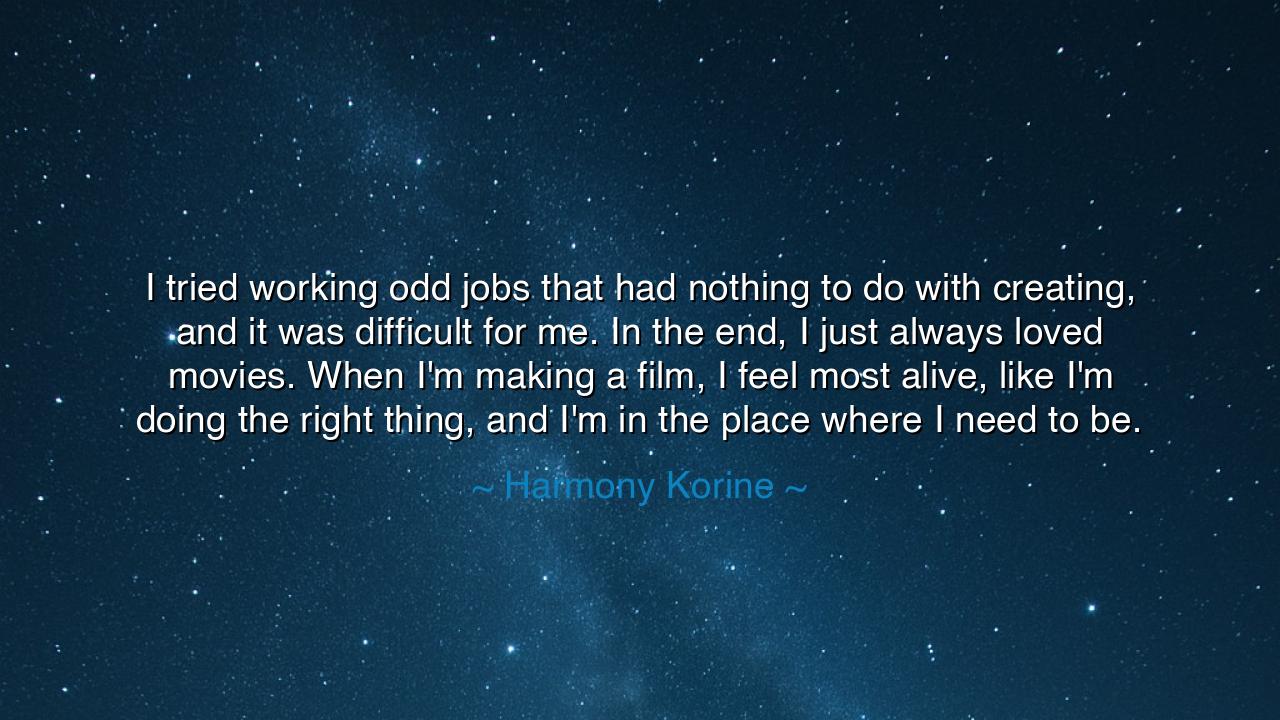
I tried working odd jobs that had nothing to do with creating
I tried working odd jobs that had nothing to do with creating, and it was difficult for me. In the end, I just always loved movies. When I'm making a film, I feel most alive, like I'm doing the right thing, and I'm in the place where I need to be.






Listen, O seekers of wisdom, to the words of Harmony Korine, who speaks of his journey toward finding his true calling: “I tried working odd jobs that had nothing to do with creating, and it was difficult for me. In the end, I just always loved movies. When I’m making a film, I feel most alive, like I’m doing the right thing, and I’m in the place where I need to be.” In these words, Korine expresses a truth that has resonated through the ages: that we are born with a purpose, and when we finally embrace that purpose, we experience a sense of fulfillment that cannot be found in any other pursuit. For Korine, it was filmmaking—a medium through which he could express his innermost self.
In the ancient world, there were those who knew their calling early on, like the great philosophers who sought the truths of life, or the poets who captured the very essence of the human soul. Plato and Aristotle, for instance, did not wander aimlessly; they knew that their purpose was to search for wisdom and teach it to others. Korine’s journey, like theirs, speaks to the essential truth that our deepest passions are the guiding force that leads us to our rightful place in the world. He tried to pursue other paths, but those paths felt unnatural to him, as if he were trying to wear clothes that didn’t fit. Only when he returned to movies did he find his true self.
Consider the tale of Leonardo da Vinci, who, though gifted in many fields, felt the deepest fulfillment in painting and sculpture. Though he dabbled in engineering and anatomy, his true genius and his most profound legacy were shaped through his artwork. His greatest works, such as the Mona Lisa and The Last Supper, were not just expressions of his technical skill, but of his soul—his personal vision and understanding of the world. Like Korine, da Vinci found his most alive moments not in the broader, more general pursuits, but in the specific act of creating what spoke directly to his heart. When we follow our true calling, as da Vinci and Korine did, we unlock the full potential of our being.
And yet, there is a deeper lesson in Korine’s words—the difficulty of living outside of one’s true purpose. Like the ancient heroes who were torn between duty and desire, Korine experienced the challenge of fulfilling the demands of life without fully engaging in what he loved. The odd jobs he mentions were necessary for survival, yet they felt hollow, like actions performed in the shadow of the soul’s true calling. In the same way, the great Achilles felt his heart torn between the love of glory and the desire to return home, and the Odysseus sought not just to return to his kingdom, but to understand his own soul. Korine’s struggle with odd jobs was his own journey toward self-realization—a journey that is often fraught with discomfort until we find our true path.
The lesson here, O future generations, is one of deep self-awareness and the courage to walk the path that calls to us, no matter how difficult it may be. Korine’s words urge us to listen to the inner voice that calls us to our true work, even if it means enduring discomfort along the way. Just as Socrates knew that his purpose was not to accumulate wealth, but to seek wisdom and challenge others to do the same, we must understand that fulfillment comes not from following society’s expectations, but from following what awakens the soul. To ignore this inner calling is to live in a state of unrest, never at peace with ourselves.
Reflect, O seekers, on the path you are walking. How often do we, like Korine, try to fit into roles that do not align with our true selves? How often do we compromise our passion for the sake of comfort or convenience? The greatness of those who have come before us—the philosophers, the artists, the poets—was not found in their willingness to conform to the world’s expectations, but in their courage to create and live according to their innermost desires. Korine’s revelation is a call to embrace that same courage in your own lives. Seek not the fleeting comforts of temporary jobs or external approval, but follow the purpose that burns inside you, for it is only in doing what you love that you can truly feel alive.
Thus, O future generations, take this lesson to heart: the right path is not always the easiest, but it is the one that will bring you closest to your true self. Like Korine, who found fulfillment in the making of films, you must recognize that your deepest passions are the compass that will guide you to a life of meaning and purpose. Do not fear the difficulties that come with this journey, for they are the very challenges that will shape your character and lead you to your ultimate fulfillment. Walk with courage, knowing that when you find the work that makes you feel most alive, you are not just succeeding in your craft—you are fulfilling your destiny.






AAdministratorAdministrator
Welcome, honored guests. Please leave a comment, we will respond soon